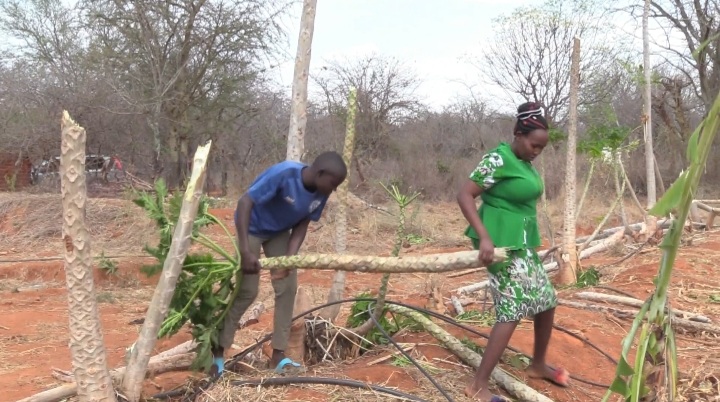 Farmers from Villages bordering Chyulu and Tsavo East assessing the damage caused by elephants in their farms. Photo by Ryan Mumo
Farmers from Villages bordering Chyulu and Tsavo East assessing the damage caused by elephants in their farms. Photo by Ryan Mumo
By Ryan Mumo
A high-stakes stakeholders’ forum convened in Kibwezi, Makueni County, to address the escalating human-wildlife conflict in villages bordering Chyulu and Tsavo East National Parks descended into heated exchanges as frustrated residents clashed with Kenya Wildlife Service (KWS) officials over the worsening crisis.
Residents narrated harrowing experiences of losing loved ones, livestock, and crops to wild animals, particularly elephants and crocodiles. They accused wildlife officials of neglecting their plight despite repeated promises of action.
Dorcas Ngotho, a farmer from the area, said the community feels abandoned after previous assurances failed to bear fruit.
“We had a meeting at Kisayani with the DCC and KWS officers who promised that in two weeks the elephants would be returned to the game reserve, but since then more elephants have come and we are suffering immensely,” she said. “They eat our crops, destroy fences, and even last night they destroyed three water tanks. When we report, some officers insult us, asking us where our husbands are. That is not how citizens should be treated.”
Another resident, Daniel Matheka, revealed that frustrations are driving locals to consider drastic measures.
“I was sent by community members to ask whether the authorities will remove the animals. If not, the people of Kathyaka Sub-location are ready to carry out an operation we call Operation Ndovu Rudi Kwao Kyulu,” he warned. “We have raised this issue many times with the help of our MPs Mutuse and Mbalu, but people now doubt whether leaders have been compromised to let elephants remain here.”
The anger in the room reflected a community at breaking point. Kikumbulyu North Ward MCA, Jackson Mbalu, warned of dire consequences if urgent intervention is not made.
“My people have suffered greatly from wildlife attacks—some have lost their lives to hippos and crocodiles, others have lost crops, water tanks, and even houses. This has pushed many families deeper into poverty,” said Mbalu. “We want immediate government intervention and compensation. If nothing is done, the people may be forced to take matters into their own hands.”
Kibwezi Assistant County Commissioner (ACC), Agnes Maswai, acknowledged the gravity of the problem and assured residents that the government is committed to solutions.
“This issue has dragged on for too long. Recently, we even lost a child to a crocodile attack. We understand the community is in distress,” she said. “As government, we will work with development partners and the community to minimize human-wildlife conflicts.”
Organizers of the forum, including Utooni Development Organization, emphasized the need for coordinated action. Executive Director, Nyambura Kamau, noted that fragmented efforts had worsened the crisis.
“Each stakeholder has been working alone, leaving citizens to suffer. Today, we hope everyone understands their roles and will leverage efforts to eliminate the human-wildlife crisis once and for all,” Kamau stressed.
As tempers flared, the session highlighted the urgent need for tangible action. With elephants still roaming farms, livestock under threat, and lives being lost, the community’s patience appears to be wearing thin—and unless swift measures are taken, residents warn they may resort to their own means of survival.